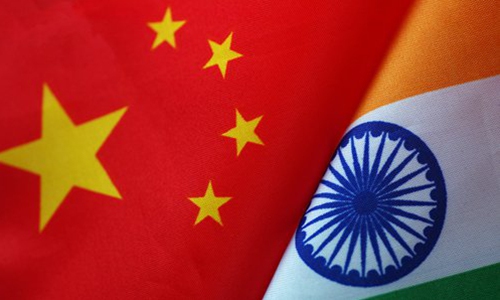China, India don’t need US help on their frictions
By Wang Wenwen Source:Global Times Published: 2020/5/28 20:33:55

Photo: IC
While Indian and Chinese forces have been engaging in a border standoff after India illegally constructed defense facilities across the border into Chinese territory in the Galwan Valley region, which is reminiscent of the 2017 Doklam stalemate, US President Donald Trump can't sit still. He turned to Twitter, saying that his country is "ready, willing and able to mediate or arbitrate their now raging border dispute."
It seems Trump finally knows that China and India, the two largest Asian powers, share borders. Early this year, A Very Stable Genius, a book written by two Washington Post journalists, revealed that Indian Prime Minister Narendra Modi was shocked and concerned when Trump told him India and China did not share a border.
To what extent Trump's personal Twitter account reflects the will of the White House remains to be seen. For the US, a conflicting China-India relationship serves its interests. Washington believes the combined strength of Beijing and New Delhi could impair its interests in Asia and beyond. An opportunist US has never given up its attempt to drive a wedge between China and India. The administration of former president Barack Obama repeatedly stated that it saw India as part of its rebalancing strategy aimed at China, and the Trump administration emphasizes India as a major pillar in its much-touted Indo-Pacific concept.
India probably has found that the US is not a reliable partner. The self-centered "America First" policy endorsed by Trump can hardly reconcile with Modi's ambitious "Make in India" campaign, and a trade deal was elusive even during Trump's high-profile visit to India in February 2020 when the two were locked in trade frictions. "You can't even mediate the divide you created in your country," an Indian Twitter user commented under the Trump's tweet.
Last year, India turned down Trump's offer to "help" and "mediate" between India and Pakistan over Kashmir, an issue India stressed can only be discussed bilaterally. India perhaps has been aware of the US' bad history of mediation in which the US made troubles rather than solved problems, and which turned bilateral disputes into multilateral ones.
For instance, the US mediation in Japan-South Korea trade disputes and the Israel-Palestine conflicts have complicated the situations. Deaths and casualties from the two warring parties keep increasing. When did the US start to behave like a peace envoy, especially under the current Trump administration? What it cares about is only its geopolitical interests.
China and India successfully solved their Doklam faceoff with concerted efforts and wisdom. The two informal summits between the leadership of the two sides, one in the Chinese city of Wuhan in 2018 and the other in the Indian city of Chennai in 2019, set the tone to maintain peace and tranquility along the border. Indian experts also believe that the special representatives' talks on the boundary question between India and China constitute an important channel of communication, and should continue in order to mitigate border standoffs and other hot issues.
The latest dispute can be solved bilaterally by China and India. The two countries should keep alert on the US, which exploits every chance to create waves that jeopardize regional peace and order.
Posted in: OBSERVER